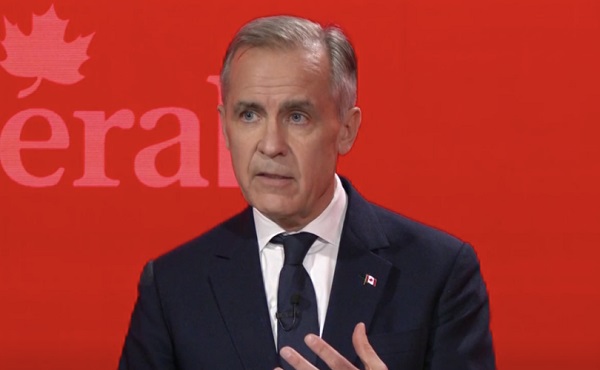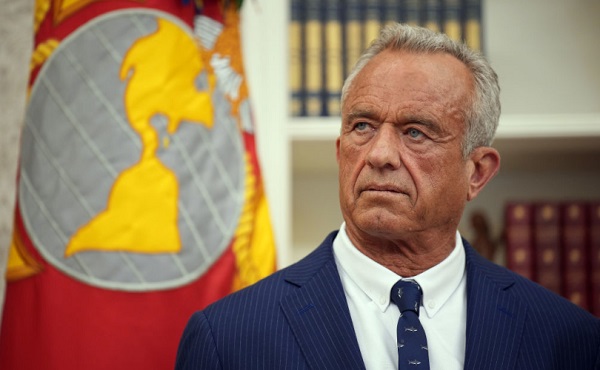Business
Liberal leadership debate sees candidates bash Trump, promise to fight ‘climate change’

From LifeSiteNews
Monday’s debate saw candidates Chrystia Freeland, Mark Carney and others accuse U.S. President Donald Trump of being the nation’s biggest threat while also restating their commitment to fighting ‘climate change.’
The first debate among Liberal leadership hopefuls Monday night saw the candidates focus heavily on bashing U.S. President Donald Trump, with all in the running also pledging their commitment to fighting “climate change.”
The French language debate, held in Montreal, saw frontrunner Mark Carney, former Finance Minister Chyrstia Freeland, and the two other lesser-known candidates, former House leader Karina Gould and former Liberal MP Frank Baylis, debate for two hours on a variety of topics, with Trump-bashing taking center stage. Freeland and Carney in particular, both of whom have ties to the globalist World Economic Forum, claimed Trump is the biggest threat Canada has faced in decades.
When asked about Trump’s ongoing threat to impose 25 percent tariffs on all Canadian goods at the start of March, Carney said, “Today’s Trump is very different from the Trump of the past,” asserting he is “more aggressive” than ever and that “he wants our country.”
Carney, who has a history of pushing the climate change narrative, was asked about his recent comments suggesting he would use emergency powers to combat Trump’s tariff threats by green-lighting energy projects in an attempt to make Canada less dependent on its neighbor to the south.
In response, Carney, whose proficiency in French seemed weaker than the others, appeared to hold back on committing to the building of pipelines from Alberta to Eastern Canada, but saying that such a project could be “possible.”
“70% of our oil comes from the U.S., our neighbor. No longer our friend, of course,” he added.
For Freeland’s part, she claimed that “Trump represents the greatest threat to Canada since World War II,” later boasting that she is the “only” one who could take on Trump via negotiation.
All the candidates said they “completely agree” that Trump is Canada’s largest “threat,” and all took turns bashing their biggest political rival, Conservative Party leader Pierre Poilievre, labeling him incompetent.
The leadership candidates also all agreed that “fighting” climate change was a priority but did not elaborate on what they would do differently than Prime Minister Justin Trudeau, whom they all praised for his “climate” leadership. Carney and Freeland, both of whom have long supported carbon taxes, vowed to eliminate the consumer carbon tax despite standing by it for years.
In addition to their ties to the WEF, both Freeland and Carney have a history of promoting or endorsing anti-life and anti-family agendas, including abortion and LGBT-related efforts.
Freeland is known by many as being the finance minister responsible for freezing the bank accounts of the 2022 Freedom Convoy participants and donors, actions Carney endorsed at the time.
Carney also recently admitted to being a “globalist” and an “elitist,” but defended the labels as positives.
The Liberal Party of Canada will choose its next leader, who will automatically become prime minister, on March 9, after Trudeau announced that he plans to step down as Liberal Party leader once a new leader has been chosen.
With respect to Trump, he has mentioned multiple times that he desires to annex Canada and turn it into a state.
Trump’s talk of taking over Canada by economic force comes at the same time he has threatened to impose massive tariffs on the nation.
Canada was given a 30-day reprieve from 25 percent tariffs by Trump at the end of January after Trudeau promised in a call to increase border security and crack down on fentanyl at the border. However, Trump has imposed a 25 percent tariff on steel and aluminum products.
Business
CBC cashes in on Carney as the news industry playing field tilts further in its favour, crippling the competition

“Private” sector will find it more difficult to compete. Plus! Outrage over manipulation of Trump speech and the common error of burying balance
These are happy days at the Canadian Broadcasting Corporation.
With the threat of a “defund the CBC” Conservative government fading ever faster in its rearview mirror, the nation’s publicly-funded commercial news and entertainment corporation (aka public broadcaster) is poised to take an even larger share of the market thanks to Prime Minister Mark Carney’s first budget.
Please consider becoming a free or paid subscriber to The Rewrite.
Your encouragement is appreciated.
Sure, tens of thousands of public sector employees may be about to lose their jobs, services face cutbacks and the feds might be rewriting collective bargaining rules in their favour. But as we learned Nov. 4, the CBC will – as promised in last spring’s election – get a $150 million top up to the $1.4 billion Parliament already allocates to it. There’s every chance that means it will be an even more aggressive competitor in the news market for viewers, listeners, readers and advertisers. One in three working journalists in the country already work for CBC/Radio Canada. If an 11 percent hike in funding is reflected in newsroom job growth, that number could move closer to 37 per cent.
Federal funding for “private sector” news organizations has remained flat (with the exception of a $12 million boost to a fund introduced as Covid relief). That means the news industry playing field has been tilted even more in the CBC’s favour, making it harder for outlets that are not the CBC to compete or even survive. There will be less opportunity for news innovators and increased private sector job losses will lead to demands for larger subsidies from industry lobby groups such as News Media Canada and the Canadian Association of Broadcasters. Good news for the CBC means bad news for others. This is either a really bad mistake by Carney or, making the CBC even more dominant as a news source (it has the most popular domestic website) is part of his plan.
Further brightening the outlook for journos at the Mother Corp was the news from CBC President Marie-Philippe Bouchard that there’s no need to investigate antisemitism within its ranks and, while its relationship with rural and western Canadians could be better, it’s unlikely the status quo will be disrupted. Editor in Chief Brodie Fenlon confirmed that conclusion by testifying before a Senate committee that the CBC’s newsrooms are the least biased he’s ever worked in.
Yup, life at the Mother Corp’s looking rosier than ever.
Perhaps as an unintended metaphor for CBC’s growth at private media’s expense, Postmedia’s Brian Passifiume illustrated his relative poverty by jocularly complaining about the lack of a free lunch for those within the budget lockup.
Time was when journos would refuse a free lunch from a subject of their coverage. Now they complain publicly about not getting one.
Speaking of the budget, a couple of items caught the eye.
One was the jaw-dropping Tweet by the Hill Times’ Stu Benson noting how journalists were partying post-budget at Ottawa’s trendy Metro Brasserie with government MPs and bigwigs. It, accompanied by photos, stated:
“Hundreds of politicos, journalists, and libatious Liberals joined Finance Minister François-Philippe Champagne for a post-budget victory lap at the @MetroBrasserie_ on Nov. 4 at @EarnscliffeCda X @politicoottawa’s”
In response, Twitter sage Norman Spector shared Benson’s post and wrote:
“How it works in Ottawa: Politicos, journalists and Liberals at a post-budget victory lap – a shindig co-sponsored by a lobbying firm.”
And media wonder why so many no longer have faith in them?
The other item involved what is termed an “advance” story posted by the CBC. The problem wasn’t that the story failed to contain all the key elements and expected perspectives. It did. The problem was that none of those were introduced at all until the 10th paragraph and you have to go another 28 paragraphs or so before the Conservatives, Bloc and NDP are even mentioned, making the piece read like a government news release. This is a common error in newsrooms where staff should know by now that most people consume news by reading a headline and – give or take – the top six paragraphs before moving on.
So, unless reporters introduce balance within the first three paragraphs, most people will be unaware that alternative views exist.
CBC is hardly alone in making this error, although its dominance in the market enhances its impact.
Please consider becoming a free or paid subscriber to The Rewrite.
Your encouragement is appreciated.
During my spells in Ottawa – briefly within the Parliamentary Press Gallery and longer at the CRTC – I was struck by how little so many reporters working there know about how government and its institutions actually work.
Most, in my recollection, cover only the drama, intrigue and theatre of politics. For too many, the daily routine consists of scanning news releases, phoning their contacts and watching Question Period on CPAC before venturing (maybe) across Wellington Street (is it still called that?) for a scrum or two.
What most don’t bother with at all are some of the most important aspects of the machinery of government such as the work of committees, the regulations that follow passage of legislation or, as Blacklock’s Reporter Publisher Holly Doan pointed out last week, the estimates that follow a budget.
These are important matters and the lack of coverage by subsidized media leaves the public ill-informed. For instance, as the Liberals move to buy off opposition MPs to form a majority government people did not vote for, they will also be able to claim control over committees.
So, as the nation morphs inexorably into a permanent one-party state, the absence of coverage in these areas will be increasingly evident. If you want to be a fully informed citizen, find a news outlet that covers these important matters and subscribe.
A little more than a year ago, people were being fired at CTV for manipulating quotes from Conservative leader Pierre Poilievre.
That practice delivered an even more devastating impact on public trust in journalism when it was revealed that the BBC program Panorama had blended two phrases from US President Donald Trump. As The Standard reported:
“In a clip from a Panorama programme, broadcast before the election, Trump appears to tell supporters: “We’re going to walk down to the Capitol…and I’ll be there with you. And we fight, we fight like hell.
“But the words were taken from different sections of his speech, nearly an hour apart. In the original footage, his language is more restrained: “We’re going to cheer on our brave senators and congressmen and women,” adding his supporters will march “peacefully and patriotically” to make their voices heard.”
Opposition MPs are demanding an inquiry. In this clip, GB News takes no prisoners. Reports Saturday indicate the chair of the BBC would be officially apologizing.
Michael Geist is not a journalist. He’s a law professor and internet expert. And his coverage of the budget – in a Substack note – was a fabulous example of the importance of a free and open internet as a source of valuable information about important matters overlooked by mainstream media. He said:
“Canadian government departments are big believers that AI will be the source of reducing expenses. Finance, Justice, CRTC, Fisheries, CRA, ESDC all cite new efficiencies from AI to explain how they will meet the 15% spending reduction target in the budget.”
And, as I wrote in The Line a couple of months back:
“Two years ago, the Liberals were hoping to claim they’d saved legacy media from Big Tech. All they really did was stake it for AI to devour.”
But you won’t read that in legacy media. Just here. Tell your friends.
Oh and one last treat for those of you who enjoy a snappy front page:
Readers will notice a new DONATE button has been added. Please consider making use of it and help us save journalism from bad journalism.
(Peter Menzies is a commentator and consultant on media, Macdonald-Laurier Institute Senior Fellow, a past publisher of the Calgary Herald, a former vice chair of the CRTC and a National Newspaper Award winner.)
Please consider becoming a free or paid subscriber to The Rewrite.
Your encouragement is appreciated.
Agriculture
The Canadian Food Inspection Agency’s Bloodlust for Ostriches: Part 2

I published an article about how the Canadian Food Inspection Agency (CFIA) failed to follow the science when trying to justify their horrific extermination of hundreds of healthy ostriches on a farm in a remote location in British Columbia, Canada. I addressed their misleading claim that it was necessary to safeguard human and animal health. Both science and plain common sense demonstrated that their claim was misinformation.
COVID Chronicles is a reader-supported publication.
To receive new posts and support my work, consider becoming a free or paid subscriber.
How legitimate is their claim that killing was necessary to preserve the export market?
Now, I cannot allow the CFIA’s second misleading rationale for slaughtering the ostriches to go unchallenged. Specifically, the CFIA claimed that the killing was also required to safeguard Canada’s almost billion-dollar poultry export market. The issue is that exports can be suspended if the policies of the World Organization for Animal Health are contravened. But what the CFIA failed to disclose to the public was that our country is not considered a single geographical zone when it comes to these policies. Rather, it is divided into numerous zones.
When looking at the World Organization for Animal Health’s Terrestrial Animal Health Code, Article 10.4.3 jumps out as being particularly important in this case. It states:
“A country or zone may be considered free from high pathogenicity avian influenza when” “absence of infection with high pathogenicity avian influenza viruses, based on surveillance […] has been demonstrated in the country or zone for the past 12 months”.
During this twelve-month timeframe, exports from anywhere within the affected zone would presumably have to be suspended and biosecurity polices adhered to. Indeed, this could be problematic if it meant shutting down the export market of an entire country for an entire year. But that was not the case here. Consider these facts:
- The farmers at the heart of this case had no need to maintain an export market within their region for the viability of their farming operation.
- Biosecurity protocols imposed by the CFIA were already being adhered to.
- It is my understanding that the ostrich farm was isolated within a remote designated zone. Therefore, suspending exports from that zone would not risk harming export potential for other farmers. Even if the zone did incorporate far-away farms, the CFIA could have done the right thing and attempted negotiating redrawing of boundaries with the World Organization for Animal Health to prevent or minimize indirect harm to other farms.
In other words, the ostriches could have been tested after the flock recovered from the disease outbreak, with testing ending twelve months later. If these tests were consistently negative, the World Organization for Animal Health would have officially declared the zone housing the ostriches to be virus-free and it would lift its moratorium on exports from that isolated zone.
My assessment is that this would have allowed the ostriches to live, with no substantial negative impact on the ability to export poultry products from Canada.
Further, common sense also places the CFIA’s rationale into question. Their battle with the farmers took place over the better part of a year while they apparently ignored this subsection of the policy, yet Canada’s poultry export market continued unhindered.
So I am curious as to why the CFIA has been so hell-bent on killing healthy ostriches to purportedly preserve Canada’s export market. Why didn’t they advocate for the farmers from the very beginning by leaning on clauses like Article 10.4.3 to negotiate with the World Organization for Animal Health? I thought that government agencies were supposed to serve the public that pays them. I saw no evidence of the CFIA trying to help the farmers. Instead they seemed focused on doing everything but try to help them. The optics would have been much better for the CFIA if they could produce documentation showing that they rigorously negotiated on behalf of the farmers about Article 10.4.3 with the World Organization for Animal Health but the latter blatantly refused to honour the requests.
Ultimately, it seems to me that the CFIA not only failed to follow the science, but it was also selective in its interpretation and defense of the policies.
It also makes me wonder if Article 10.4.3 had anything to do with why the CFIA was so adamant about not allowing the birds to be tested almost one year after the outbreak. To have demonstrated an absence of the virus almost one year later would have shown that they were on the cusp of being able to use Article 10.4.3 to restore Canada’s coveted country-wide avian influenza-free status.
By the way, all countries claiming to have avian influenza-free status are misleading people. Avian influenza viruses are endemic. They are carried and transmitted by wild birds, especially waterfowl, that migrate around the globe.
The most hypocritical aspect of this is that the people responsible for the deaths of hundreds of valuable, healthy ostriches that were almost certainly virus-free (prove me wrong with data), likely let their own kids play on beaches and parks that are routinely populated by ducks, geese, and seagulls, and stipple-painted with the feces of these birds that serve as natural reservoirs for the virus.
All hail the hypocritical virtue signaling!
To be consistent with their reasoning, every person that supported what the CFIA did to the healthy ostriches should never step foot on any premises frequented by wild birds.
COVID Chronicles is a reader-supported publication.
To receive new posts and support my work, consider becoming a free or paid subscriber.
-

 Alberta2 days ago
Alberta2 days agoTell the Province what you think about 120 km/h speed limit on divided highways
-

 Energy1 day ago
Energy1 day agoThawing the freeze on oil and gas development in Treaty 8 territory
-

 National1 day ago
National1 day agoNew Canadian bill would punish those who deny residential indigenous schools deaths claims
-

 Alberta2 days ago
Alberta2 days agoAlberta’s number of inactive wells trending downward
-

 Censorship Industrial Complex2 days ago
Censorship Industrial Complex2 days agoSchool Cannot Force Students To Use Preferred Pronouns, US Federal Court Rules
-

 armed forces2 days ago
armed forces2 days agoThe Liberal Government Just Betrayed Veterans. Again. Right Before Remembrance Day.
-

 Health2 days ago
Health2 days agoRFK Jr. urges global health authorities to remove mercury from all vaccines
-

 Business1 day ago
Business1 day agoWhat Pelosi “earned” after 37 years in power will shock you







